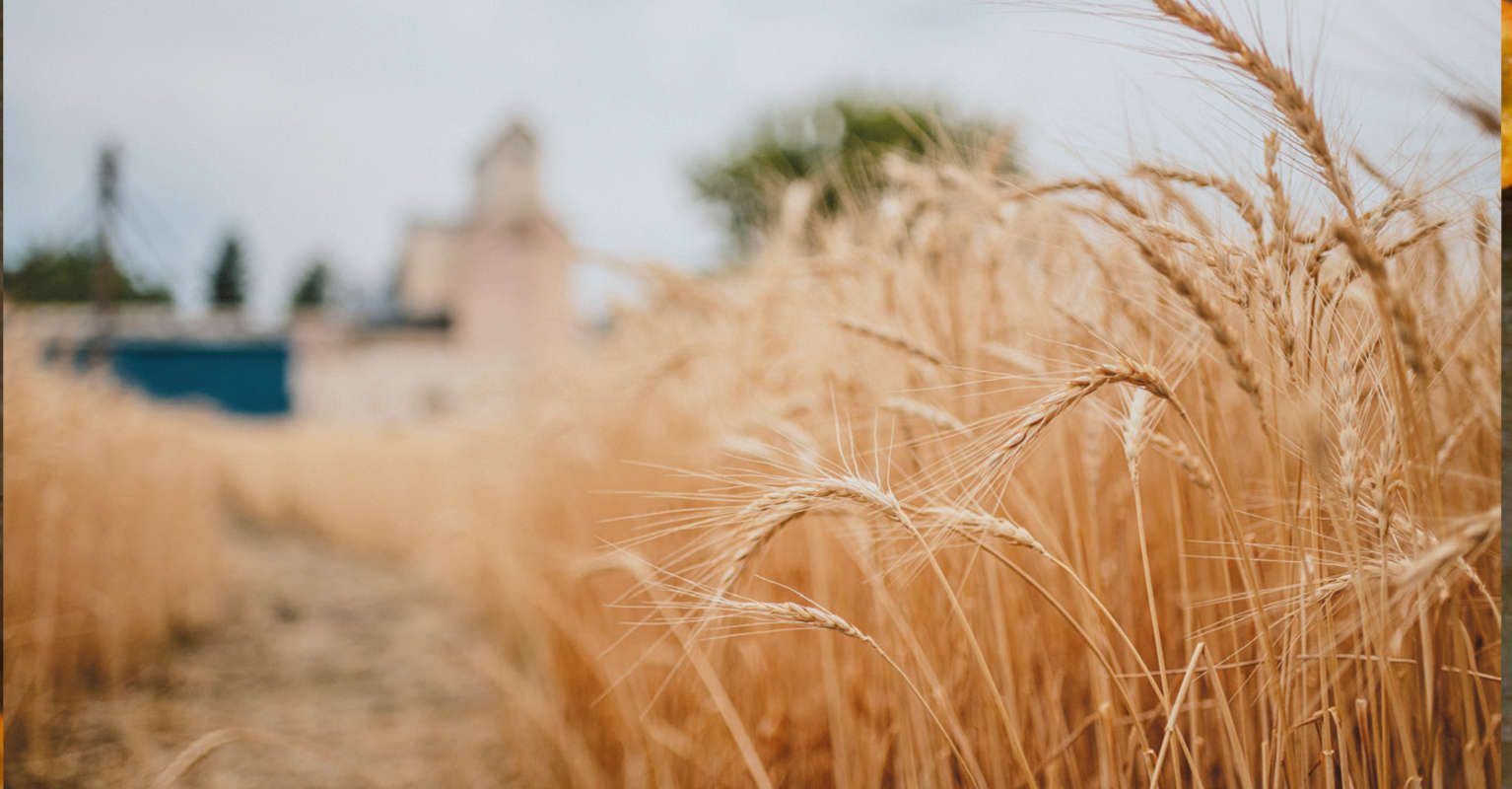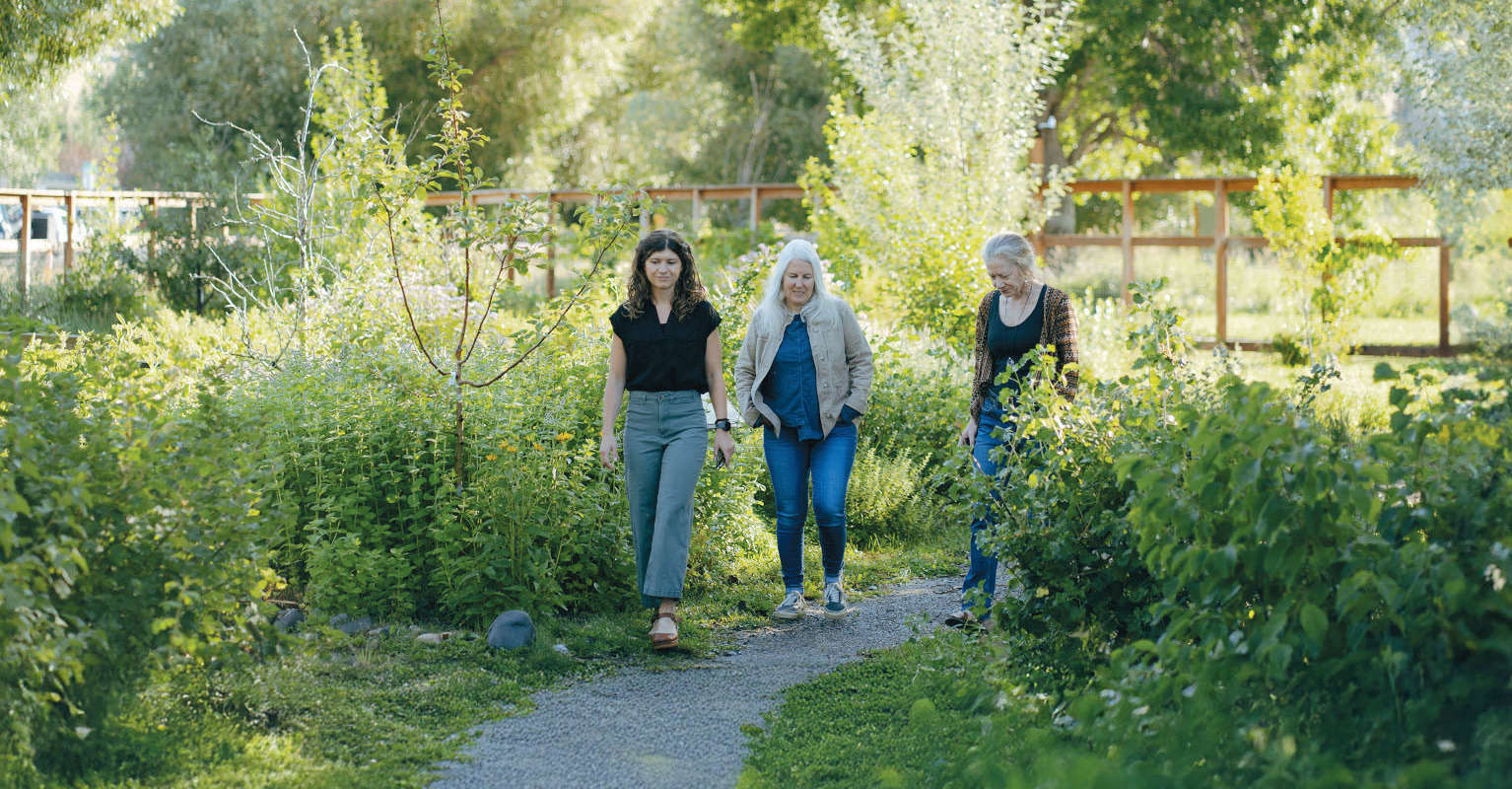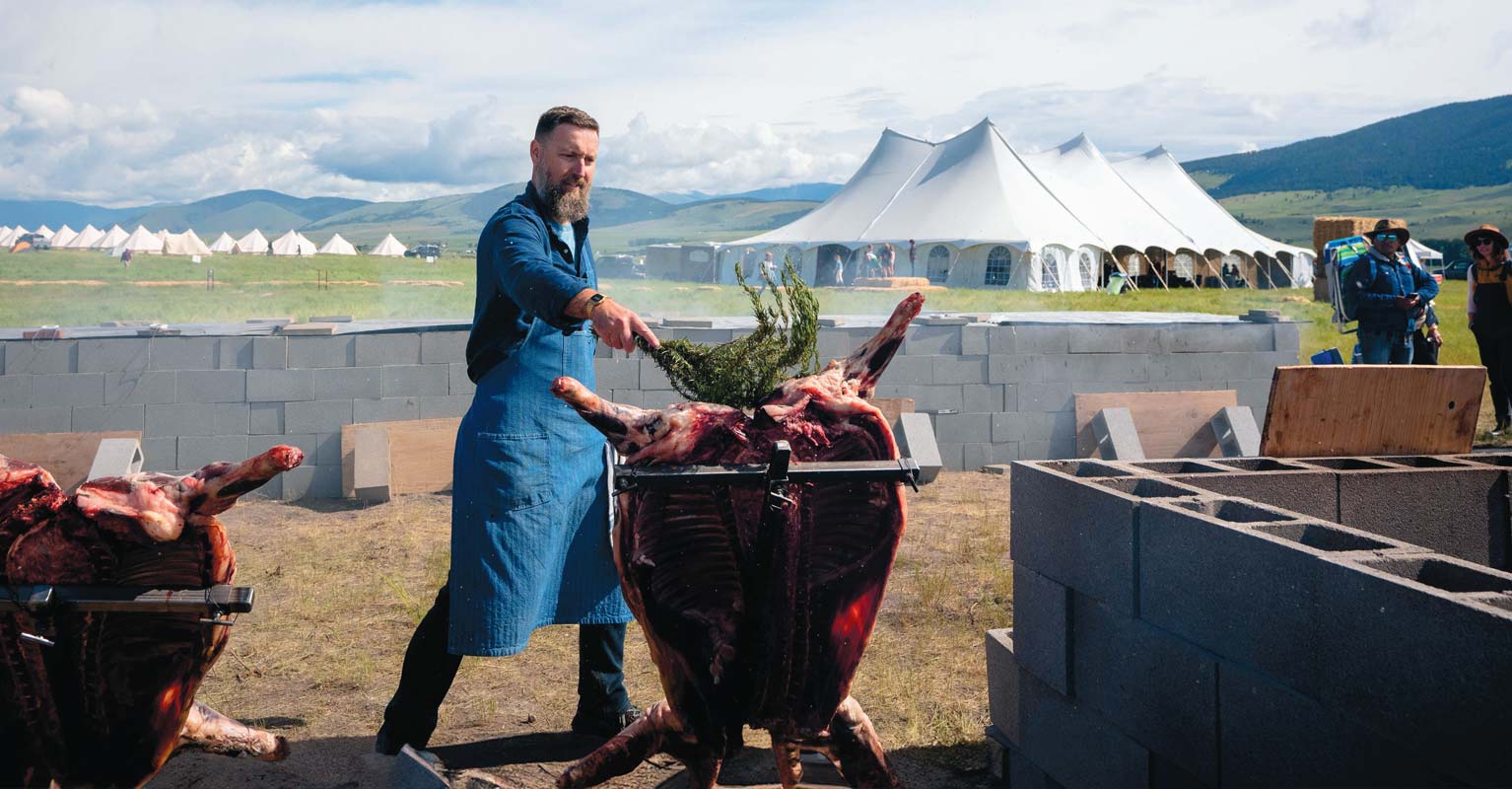Scott Myers | Backcountry Dining
Bozeman Private Chefs Embrace Creative Freedom
Barely three feet off the side of a dirt road in Gallatin Gateway, Montana, chef Scott Myers leans into a shrub nearly his height and plucks a berry from a thorny branch. He rolls the orange fruit between his thumb and index finger, examining the dark spots where the berry is beginning to sweeten.
“These are buffalo berries,” he explains before dropping it into a small sack. It’s mid-August, which for Myers means taking a slight step back from his busy schedule as a private chef to make time for foraging and, soon, hunting. Much of his harvest will yield the backbone ingredients for his unique dishes, creating a connection to place that is infused in every preparation. He says the buffalo berries will likely become a sauce, perhaps for some game meat like the Dall sheep he prepared for a client a few weeks ago. It’s the food he’s always wanted to cook—the food he’s spent his entire career fighting to cook.
Myers has spent his tenure as a chef earning acclaim in celebrated kitchens, but he left that behind last year when he started his own private chef company, Backcountry Dining, to reap the benefits of culinary independence. His journey, while unconventional, is not unlike those of a handful of other private chefs in southwest Montana.
Despite their varied backgrounds, these chefs share a common aim: to cook food their way. On top of assuming financial risk to go out on their own, each also embraced the vulnerability of serving their own name and art on a public plate. As a reward, they are enjoying success in their businesses and fulfillment in their work. Here we share a bit of their stories as a celebration of their contributions to our area’s culinary community, as well as an inspiration to follow your own dreams.
Scott Myers | Backcountry Dining
On a crisp spring evening, Myers works in my home kitchen, lining up a trio of plates on the counter. On them he places raw halibut, the finger-length cuts only the slightest bit off-white from a marinade of avocado oil, lemon peel, thyme, and pink salt. To brighten the dish, he adds an agrodolce pickled spring onion, local oyster mushrooms, sweet red peppers, and radish. But the piece of this dish that perhaps exemplifies Myers’ brand the most as a private chef is a smoked oat straw vinegar he started fermenting a few months ago that he uses to finish his crudo.
Myers cooks with flavors of the land in the most literal way—the taste of that smoked oat straw vinegar was undeniably reminiscent of an infinite Montana prairie. His process begins well before he even arrives in the kitchen. The buffalo berries are an example, as are the mushrooms, succulents, mosses, roots, and flowers he harvests.
Myers says that after leaving his most recent of many gigs as an executive chef in a restaurant, his niche cuisine started with a slower burn. For him, it’s never been about the money—a value that’s allowed him to stay true to his unique style and experimental flavors. Now, more than a year into running his own business, Backcountry Dining has taken root with the clientele Myers always hoped for.
“I’m getting the people that want that kind of food, [that] want that kind of experience,” he says. These people look to him for something new, something they probably can’t get anywhere else in the area. Take his client’s Dall sheep for example, which Myers transformed into a rich carpaccio. He aims for his food to have resonance beyond its mere flavor, for his dishes to embody something bigger than a bite. “It’s more of a story than it is just stuffing your face full of food.”
When Myers talks about his vision, as well as what ushered him into work as a private chef—something he never saw for himself—he uses the word exceptional. It’s what he never felt he had permission to strive for in restaurants; it’s what he wants to be. As his own boss who can serve a clientele that shares his culinary values, he’s able to push boundaries and experiment, all while retaining a sense of place by cooking with the same hands he uses to forage and hunt around his home.
“One thing that I really pride myself on, in the last year and a half of being a private chef, is that for every meal that I do I try two or three new things that I’ve never done before.” —Daniel Cox
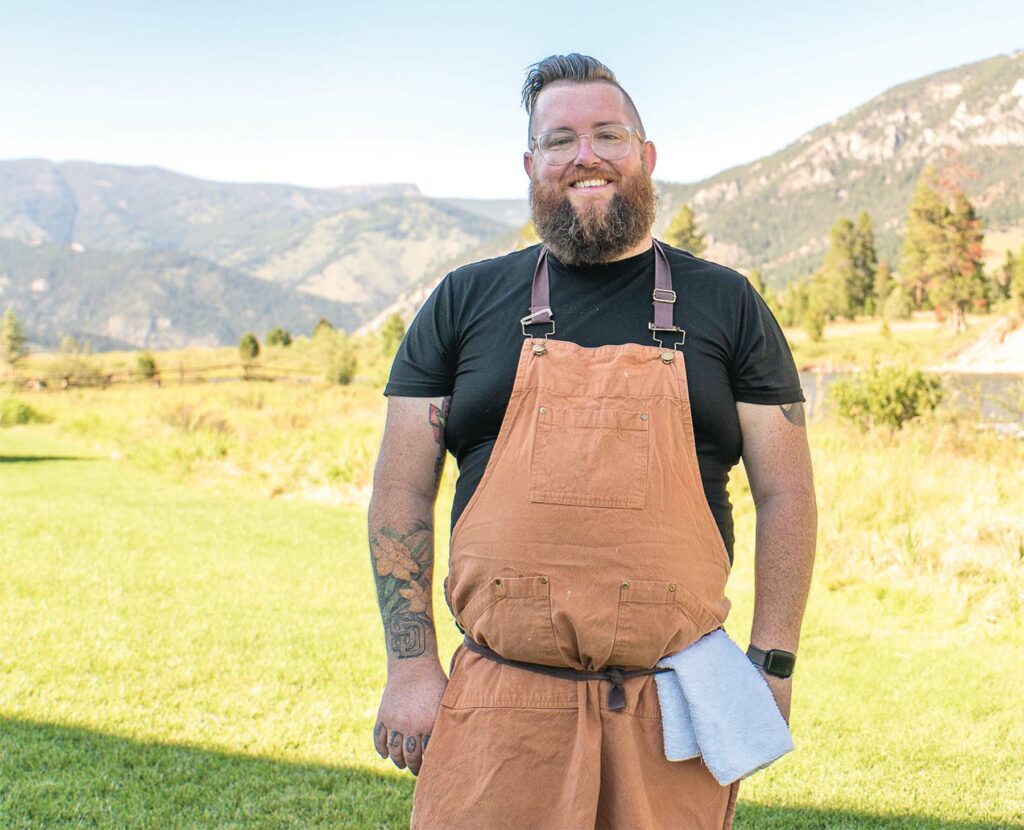
Daniel Cox | Chef Daniel Cox
On the same occasion Myers prepared his crudo, Daniel Cox stirs a pot of French onion soup. The beef in his soup is chuck roast from DeBruycker Charolais, a ranch in Dutton, Montana, that raises the sought-after French Charolais cattle breed. The dish is a reimagined leftover from a private chef gig he worked the night before, which, after a long and esteemed career in restaurants, is where Cox now spins his gold.
“This is the longest I’ve been out of restaurants my entire life—since I was 16 years old,” says Cox, who’s now 37. He delivers part of his biography in a matter-of-fact sort of way, no sense of mourning to be detected. The reason? “This is my 19th year cooking in professional kitchens … and I’m cooking my food—my food—more now than ever.”
The term my food turns out to be a loaded one—Cox has a number of elements that define his style, including coastal influence from his extensive time in Seattle—but what it seems to boil down to is another freedom Cox celebrates as a private chef: the ability to challenge himself.
“One thing that I really pride myself on, in the last year and a half of being a private chef, is that for every meal that I do I try two or three new things that I’ve never done before,” he says. He defines his brand as somewhat undefined; boundless. “It keeps me engaged and keeps me focused and excited. I really do think that it rubs off on my clients and the people that are having dinner with me that night. … It’s really fun. I don’t have to conform.”
As a private chef, Cox is not only an artist but a performer. He’s already built a clientele around Bozeman that acts as a fanbase, quick to call Cox a friend and post praise on social media, and Cox himself exudes a sort of celebrity. He commands attention when he walks into a room with his jovial voice, big smile, and personal gallery of tattoos—and his food reflects his boldness.
Claudia Krevat prides herself on being a chef of the world, demonstrated both by the globally expansive library of cookbooks swallowing her kitchen and dining room and the slogan on her website: “one world one table.”
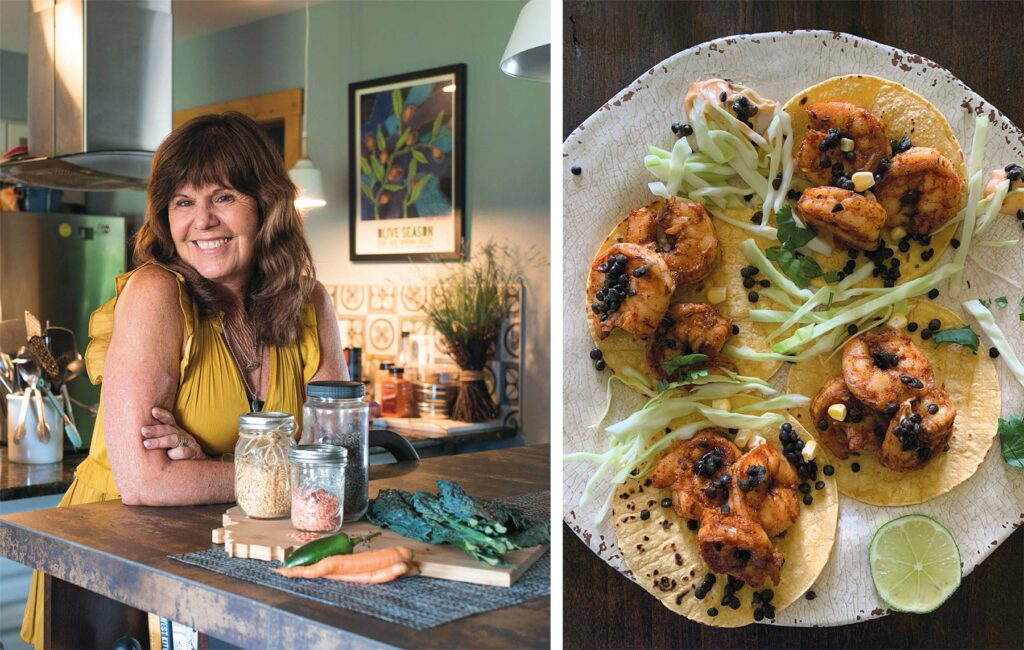
Claudia Krevat | Claudia’s Mesa
At age 18, before Claudia Krevat could leave her home in Barranquilla on Colombia’s northern coast for school in Miami, she had to pass one test: Her family’s cook, whom she had assisted her whole life, took off her apron one evening and told Krevat it was her turn to prepare the family meal. True to Krevat’s nature—which even in her 60s is vivacious and individual beyond measure—she tossed aside all the cook’s recipes and whipped up her own version of a classic meal from her childhood: coconut rice and lentils.
Krevat’s career path since then has been winding, taking her through stints in government and nonprofit work, a foray in hospitality, and even flooring sales, but the kitchen has always beckoned her. She’s dabbled in commercializing her food passion throughout her life, as an in-home chef and with larger-scale ventures.
Now a private chef working under the company Claudia’s Mesa in Bozeman, where she’s lived for more than two decades, Krevat views this role as the culmination of an interdisciplinary life. Being a private chef is a deeply personal approach to food and is therefore not just about cooking; it’s about people.
“It is just so much [more] personable, and you have a rapport, and you establish a relationship,” Krevat says, adding that her favorite thing about her work is the one-on-one connection with clients. Often she’s present for intimate moments in a person’s life: a funeral, a celebration, or even simply a dinner shared with loved ones.
Krevat lights up when she describes food from her home country, like the mouthwatering cornmeal cakes called arepas, but she prides herself on being a chef of the world, demonstrated both by the globally expansive library of cookbooks swallowing her kitchen and dining room and the slogan on her website: “one world one table.”
“Food should be about gathering, sharing, telling stories. It’s really about connecting with your friends and family over awesome, wholesome food, and connecting with what we can grow and raise here.” —Austin Quinn
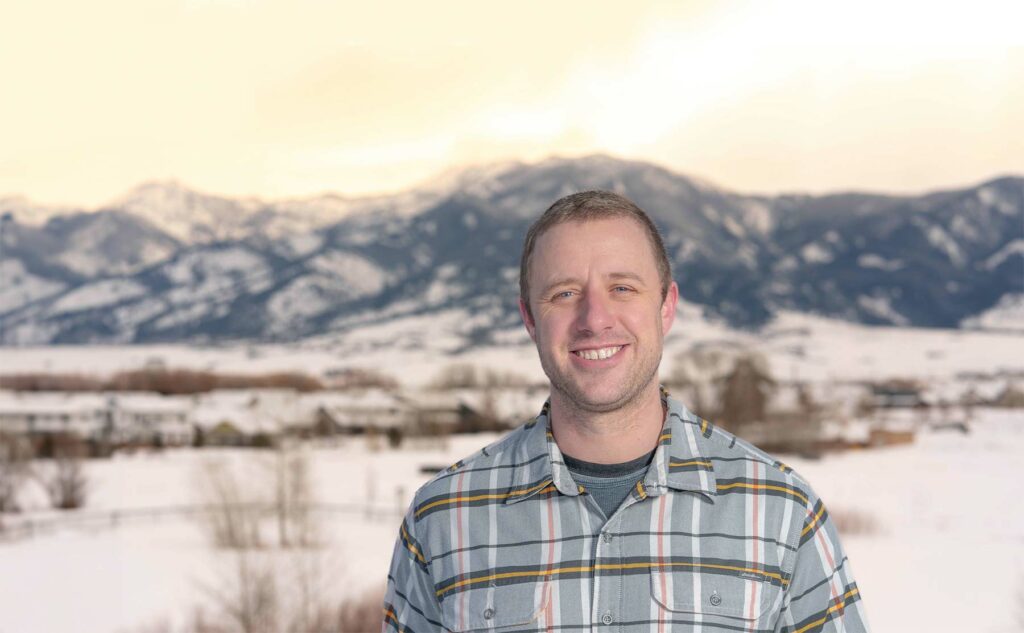
Austin Quinn | Gather
When Austin Quinn moved to Bozeman in 2012, he thought he was done working in the food industry. Quinn grew up in Helena and was inspired to pursue a career in cooking after working for a Thai restaurant in high school. He went to culinary school in Portland and earned his chops early on working in premier venues in the city such as Thirst, Higgins, and Pok Pok. He eventually returned to his home state and worked in Missoula at a start-up Asian fusion restaurant, after which he followed the owner to Charlo, Montana, to work for Ninepipes Lodge.
By the time he arrived in Bozeman, his breadth of experience had given him a bank of knowledge, but also somewhat of a chip on his shoulder, and he wasn’t sure of his next move. “I was just stuck in a box,” he says, describing the restaurant industry as “turn and burn, making pennies on all the hard work. At that point, I was just not educated enough to know that there are other avenues of this industry that are not only way more monetarily beneficial but spiritually beneficial.”
Soon, Quinn was drawn back into cooking, further peppering his resume around town before an inflection point in late 2020. He quit his catering job, tired of working as an employee. He’d been nursing the idea of starting a business of his own and with his wife’s encouragement, he went all in.
That leap was scary, he says. He wasn’t entirely confident in himself, and it was a financial risk. But now, a few years later, Quinn is taken aback by Gather’s success. “Here we are, doing the things and having the things I never thought possible,” he says, tickled with the whimsy of a dream come true. “I still can’t believe it.”
Quinn revels in the close connections he’s been able to forge with the people he’s cooking for. He now sees the restaurant line where he once cooked as a barrier—between him and his customers as well as between him and the places where he was cooking.
“Food should be about gathering, sharing, telling stories,” he says. “It’s really about connecting with your friends and family over awesome, wholesome food, and connecting with what we can grow and raise here.”


